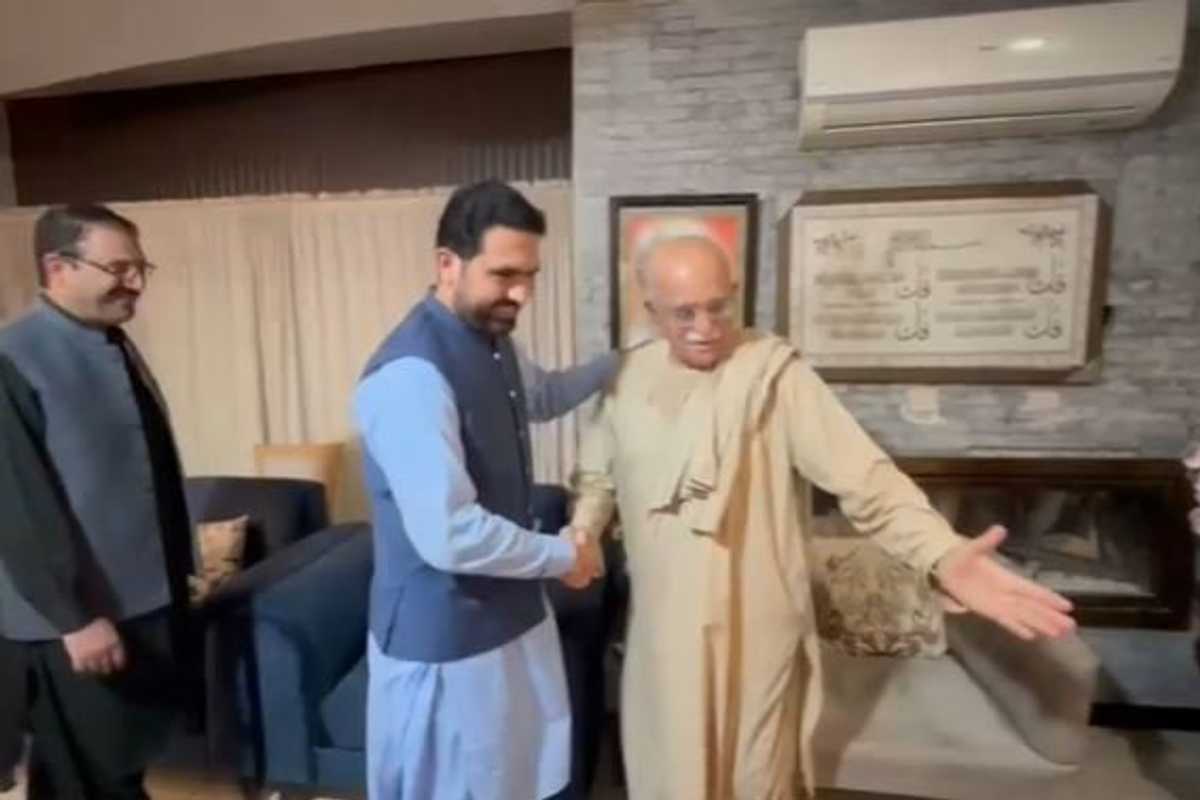CM of northwest Pakistan meets veteran politician amid fears over constitutional overhaul
Sohail Afridi meets Mahmood Khan Achakzai in Islamabad as govt seeks a two-thirds majority to centralize some provincial powers

Javed Hussain
Correspondent
I have almost 20 years of experience in print, radio, and TV media. I started my career with "Daily Jang" after which I got the opportunity to work in FM 103, Radio Pakistan, News One, Ab Tak News, Dawn News TV, Dunya News, 92 News and regional channels Rohi TV, Apna Channel and Sach TV where I worked and gained experience in different areas of all three mediums. My journey from reporting to news anchor in these organisations was excellent. Now, I am working as a correspondent with Nukta in Islamabad, where I get the opportunity of in-depth journalism and storytelling while I am now covering parliamentary affairs, politics, and technology.

Chief Minister of Khyber Pakhtunkhwa Sohail Afridi arrives for a meeting with Pashtoonkhwa Milli Awami Party Chairman Mahmood Khan Achakzai in Islamabad on Nov. 4, 2025.
Screengrab
The chief minister of Pakistan’s northwest Khyber Pakhtunkhwa province — a region governed by jailed former Prime Minister Imran Khan’s Pakistan Tehreek-e-Insaf — met a veteran Pashtun nationalist politician in Islamabad on Tuesday as the central government pursues major constitutional changes that critics warn could erode provincial powers.
Suhail Khan Afridi, the chief minister, held talks with Mahmood Khan Achakzai, chairman of the Pashtoonkhwa Milli Awami Party, at Achakzai’s residence. The meeting brought together senior figures opposed to the proposed constitutional overhaul, which could shift authority and financial control back to Islamabad.
Also present were Senator Allama Nasir Abbas, who has been nominated as the leader of the opposition in the Senate, along with senior figures from PTI. They included KP President Junaid Akbar and federal lawmakers Atif Khan, Ali Asghar Khan, Dr Amjad, Arbab Sher Ali, Akhunzada Hussain Ahmad Yousafzai, Khalid Yousaf Chaudhry — a lawyer for PTI’s jailed founder — and Irfan Saleem.
The participants discussed political developments affecting Khyber Pakhtunkhwa, a province bordering Afghanistan and grappling with a resurgence in militant attacks. They reviewed concerns over ongoing military operations in the region and what they described as growing pressure on residents.
Key focus: 27th Constitutional Amendment
According to sources, the proposed 27th Constitutional Amendment was a key focus. The leaders voiced reservations over decisions they believe are being made without transparency or broader consultation.
They also warned that the federal government has not delivered on its promise to provide a larger share of national tax revenue to the province’s newly merged tribal districts — areas that were previously governed under a separate colonial-era legal system. Any further reduction in revenue allocations through the National Finance Commission (NFC) Award, they cautioned, could inflame regional grievances and threaten national unity.
The group also discussed local peace efforts in Kurram district and plans for a forthcoming tribal Peace Jirga in Peshawar.
Afridi and Achakzai pledged that the Movement for the Protection of Pakistan’s Constitution — a political alliance — and the KP government would work together to defend the province’s constitutional and economic rights.
High-stakes amendment battle in parliament
Pakistan’s federal government, led by the Pakistan Muslim League-Nawaz (PML-N), is attempting to secure the two-thirds majority required to approve the constitutional amendment. The proposal would bring significant structural changes to governance in the country.
Under Pakistan’s constitution, any amendment must be approved separately by a two-thirds majority in both houses of parliament: the National Assembly and the Senate.
In the 336-member lower house, the governing coalition currently holds 237 seats — enough to pass the measure if the alliance remains intact. But that majority depends on the support of the Pakistan Peoples Party (PPP), a key coalition partner.
The PPP’s Central Executive Committee is scheduled to review the amendment on Nov. 6. If it pulls out of the coalition, the measure would become mathematically impossible to pass.
The numbers are even tighter in the 96-member Senate, where 64 votes are needed. The coalition controls 60. It would require the support of at least three independent senators to meet the threshold.
Lawmakers aligned with PTI have pledged to boycott and protest the vote, intensifying the political confrontation.
Concerns over rollback of devolution
The federal government says the amendment is needed to reform key national institutions. But critics — particularly in provinces that feel historically underrepresented — say power would shift back to Islamabad at the expense of local governments.
The proposed changes include the creation of a powerful Federal Constitutional Court, the re-centralization of education and population planning, and revisions to the role of the military in the constitution.
Analysts say the amendment could undo progress made under the 18th Constitutional Amendment in 2010, which devolved wide-ranging powers over governance and spending to provincial governments.
Analysts warn of instability
Political analyst Hasan Askari told Nukta that centralizing power could weaken the federal system over time.
“Taking powers away from the provinces does not strengthen the federation,” he said. “What the government really seeks is political control, not institutional balance.”
Askari said the proposal puts the PPP in a difficult position, given the party’s long-standing support for provincial rights.
Analyst Salman Ghani warned the changes would also have financial consequences, tightening provincial budgets already under stress.
“Everything is happening in a very secretive way,” he said. Ghani noted that the previous amendment — passed in 2024 — was pushed through parliament with minimal public debate.
He added that political parties are now too weak to resist external pressure.
“It seems that federalism is beginning to dominate once again,” he said.







Comments
See what people are discussing